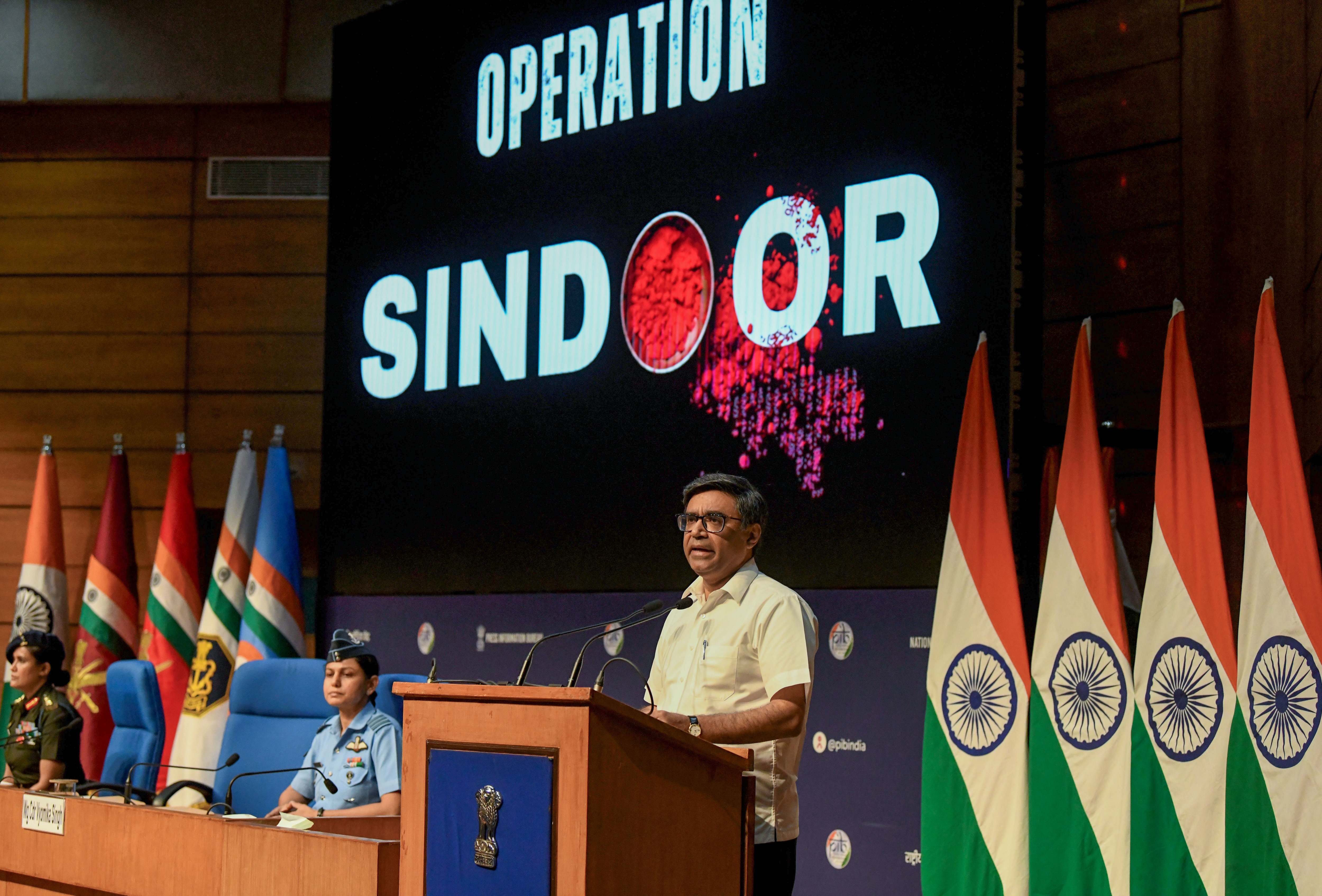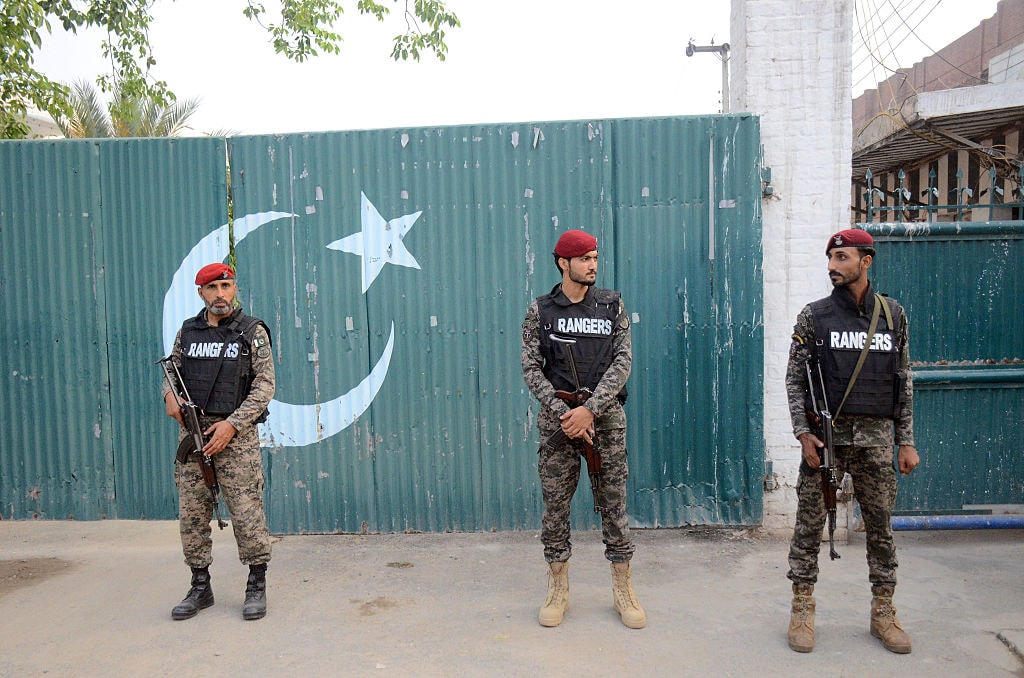India's precision military strikes on nine terror targets across Pakistan and Pakistan-occupied Kashmir (PoK) under were described by strategic experts as a "measured" and "just" response to the April 22 terror attack in that left 26 people dead, most of them tourists. Experts across the diplomatic and defence spectrum highlighted the significance of the operation in sending a clear message: "Enough is enough."
#PahalgamTerrorAttack
— ADG PI - INDIAN ARMY (@adgpi) May 6, 2025
Justice is Served.
Jai Hind! pic.twitter.com/Aruatj6OfA
In a press briefing, Wing Commander emphasized that "no military establishments were targeted" during the operation, highlighting the focused and restrained nature of the strike.
#WATCH |Delhi | #OperationSindoor| Wing Commander Vyomika Singh says, "Operation Sindoor was launched by the Indian Armed Forces to deliver justice to the victims of the Pahalgam terror attack and their families. Nine terrorist camps were targeted and successfully destroyed...… pic.twitter.com/Gmw6WHrYVO
— ANI (@ANI) May 7, 2025
According to military officials, the Indian strikes targeted nine key terror infrastructure across Pakistan and PoK:
- Markaz Subhan Allah, Bahawalpur - JeM
- Markaz Taiba, Muridke - LeT
- Sarjal, Tehra Kalan - JeM
- Mehmoona Joya, Sialkot - HM
- Markaz Ahle Hadith, Barnala - LeT
- Markaz Abbas, Kotli - JeM
- Maskar Raheel Shahid, Kotli - HM
- Shawai Nalla Camp, Muzaffarabad - LeT
- Syedna Bilal Camp, Muzaffarabad - JeM
These locations were believed to be active operational hubs for training, logistical support, and planning of cross-border attacks.
#WATCH | Indian Army shares video of strike on Abbas Terrorist Camp at Kotli in PoJK
— ANI (@ANI) May 7, 2025
According to the Indian Army, Abbas Terrorist Camp at Kotli was the nerve centre for training suicide bombers of Lashkar-e-Taiba (LeT) and it had key training infrastructure for over 50… pic.twitter.com/fnV45ZC8wt
#OperationSindoor | Indian Army releases videos of Indian strikes on Pakistani terror camps. Nine terrorist camps were targeted and successfully destroyed.
— ANI (@ANI) May 7, 2025
(Videos Source: Indian Army) pic.twitter.com/oO1giR1xFC
What experts said about Operation Sindoor
Former Indian Ambassador to Italy, K P Fabian, said the move was "just and fair" given the trauma caused by the Pahalgam attack, but he warned of possible retaliation.
“Still the question remains, how Pakistan will see it. Further development will depend on Pakistan's response, which we will have to wait and see," he was quoted as saying in a PTI report.
"What is required is not a counter-strike but a proper declaration saying that Pakistan's soil will never be used or will never be permitted for carrying out terror attacks against any other country, including India," Fabian added.
He added that such a statement must be followed by verifiable action on the part of Pakistan in dismantling terror infrastructure and "re-orienting misguided youths." "If this happens, we are in a good position," he added.
Meanwhile, US Congressman Shri Thanedar voiced his support for India’s approach and highlighted the precision and intention behind the operation.
“India has shown great restraint here. It could have indiscriminately and wildly attacked Pakistan. It did not. This was a very measured response, very thoughtful response. There should not be any escalation. India has a right to fight terrorism," he was quoted as saying in a PTI report.
Kobbi Shoshani, Israel's Consul General to Midwest India, also backed the Indian response, drawing parallels with Israel’s experience of terrorism. “India has a right to defend itself and this was self-defence against a terrorist attack on innocent people of India," he told PTI.
Calling the Pahalgam attack “unacceptable”, Shoshani reiterated that the strike conveyed a clear message that “enough is enough.”
Diplomatic Outreach: India Engages Global PowersFollowing the operation, India launched an extensive diplomatic outreach to explain the rationale behind the strikes. External Affairs Minister S Jaishankar held conversations with his counterparts from Germany, France, Spain, and Japan, reiterating that the strikes were directed specifically at terror infrastructure.
“Appreciated their solidarity and support in the wake of the Pahalgam terrorist attack. Discussed ensuring zero tolerance for terrorism,” Jaishankar said in a post after his joint call with French and German officials.
The world must show zero tolerance for terrorism. #OperationSindoor pic.twitter.com/dmcCLfbMjN
— Dr. S. Jaishankar (@DrSJaishankar) May 7, 2025
National Security Adviser Ajit Doval also engaged in diplomatic dialogue with his counterparts from major global powers including the US, China, Russia, the UK, Saudi Arabia, UAE, Japan, and France.
A source familiar with the outreach said, “The NSA briefed his counterparts on actions taken and the method of execution, which were measured, non-escalatory and restrained. He emphasised India had no intent to escalate but is well prepared to retaliate resolutely should Pakistan decide to escalate.”

Foreign Secretary Vikram Misri briefed ambassadors of 13 permanent and non-permanent members of the UN Security Council, including those from China and Russia. Misri reportedly underlined that the strikes were: “Targeted, measured and non-escalatory.”
He explained that India’s decision came after Pakistan took no demonstrable steps to act against terrorist infrastructure operating on its soil, particularly in response to the Pahalgam massacre.
Misri said the strikes were aligned with the UN Security Council’s call to bring to justice those responsible for acts of terror, including the perpetrators, planners, financiers, and sponsors.
Experts and diplomats widely interpreted Operation Sindoor as a strategic, proportionate response aimed at eliminating specific terror targets without drawing the region into a wider conflict. While India asserted its right to self-defence, it also reinforced its intent to maintain peace — provided there is no further provocation.
The world is now watching Pakistan's response — a critical variable that will determine whether South Asia maintains its fragile calm or veers towards deeper conflict.
You may also like

Singapore issues travel advisory asking citizens to avoid J&K, Pak

Horror as body pulled from east London canal as police set up cordon

'It's all over social media': Pakistan defence minister khwaja Asif's bizarre response when asked for proof of downing Indian jet

Skype: Microsoft shut down Skype, why did it take such a big decision?

Angela Rayner deals blow to thousands of homes with 1.5m building blitz in flood zones







